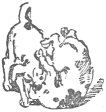Having devoted an entire blog post to a cat, it’s only fair that I give dogs their turn during Animal Month here at Memoranda. I couldn’t think of any dog poems that I loved, but here are some excerpts about one of my favourite fictional dogs, Montmorency from Three Men in a Boat (To Say Nothing of the Dog).
“To look at Montmorency you would imagine that he was an angel sent upon the earth, for some reason withheld from mankind, in the shape of a small fox-terrier. There is a sort of Oh-what-a-wicked-world-this-is-and-how-I-wish-I-could-do-something-to-make-it-better-and-nobler expression about Montmorency that has been known to bring the tears into the eyes of pious old ladies and gentlemen.
When first he came to live at my expense, I never thought I should be able to get him to stop long. I used to sit down and look at him, as he sat on the rug and looked up at me, and think: ‘Oh, that dog will never live. He will be snatched up to the bright skies in a chariot, that is what will happen to him.’
But, when I had paid for about a dozen chickens that he had killed; and had dragged him, growling and kicking, by the scruff of his neck, out of a hundred and fourteen street fights; and had had a dead cat brought round for my inspection by an irate female, who called me a murderer; and had been summoned by the man next door but one for having a ferocious dog at large, that had kept him pinned up in his own tool-shed, afraid to venture his nose outside the door for over two hours on a cold night; and had learned that the gardener, unknown to myself, had won thirty shillings by backing him to kill rats against time, then I began to think that maybe they’d let him remain on earth for a bit longer, after all.”

When we first meet Montmorency, he is helping Jerome, Harris and George pack for their boating holiday, although the three men don’t always appreciate the dog’s assistance:
“Montmorency’s ambition in life is to get in the way and be sworn at. If he can squirm in anywhere where he particularly is not wanted, and be a perfect nuisance, and make people mad, and have things thrown at his head, then he feels his day has not been wasted.
To get somebody to stumble over him, and curse him steadily for an hour, is his highest aim and object; and, when he has succeeded in accomplishing this, his conceit becomes quite unbearable.
He came and sat down on things, just when they were wanted to be packed; and he laboured under the fixed belief that, whenever Harris or George reached out their hand for anything, it was his cold, damp nose that they wanted. He put his leg into the jam, and he worried the teaspoons, and he pretended that the lemons were rats, and got into the hamper and killed three of them before Harris could land him with the frying-pan.
Harris said I encouraged him. I didn’t encourage him. A dog like that don’t want any encouragement. It’s the natural, original sin that is born in him that makes him do things like that.”
Montmorency has quite a few adventures during their holiday, including an encounter with a tomcat:
“I like cats; Montmorency does not.
When I meet a cat, I say, ‘Poor Pussy!’ and stop down and tickle the side of its head; and the cat sticks up its tail in a rigid, cast-iron manner, arches its back, and wipes its nose up against my trousers; and all is gentleness and peace. When Montmorency meets a cat, the whole street knows about it; and there is enough bad language wasted in ten seconds to last an ordinarily respectable man all his life, with care.”
 However, Montmorency has met his match with this particular Tom (“there was something about the look of that cat that might have chilled the heart of the boldest dog”). Montmorency also comes off the worst in an encounter with a kettle, but this doesn’t stop him helping with the cooking – for example, when the men decide to make an Irish stew:
However, Montmorency has met his match with this particular Tom (“there was something about the look of that cat that might have chilled the heart of the boldest dog”). Montmorency also comes off the worst in an encounter with a kettle, but this doesn’t stop him helping with the cooking – for example, when the men decide to make an Irish stew:
“Montmorency, who had evinced great interest in the proceedings throughout, strolled away with an earnest and thoughtful air, reappearing, a few minutes afterwards, with a dead water-rat in his mouth, which he evidently wished to present as his contribution to the dinner; whether in a sarcastic spirit, or with a genuine desire to assist, I cannot say.”
Montmorency may have begun the book by advising the men not to embark on their trip (“He never did care for the river, did Montmorency”), but he valiantly supports them throughout their travails, so it’s only fitting that he has the last word:
“‘Well,’ said Harris, reaching his hand out for his glass, ‘we have had a pleasant trip, and my hearty thanks for it to old Father Thames—but I think we did well to chuck it when we did. Here’s to Three Men well out of a Boat!’
And Montmorency, standing on his hind legs, before the window, peering out into the night, gave a short bark of decided concurrence with the toast.”

